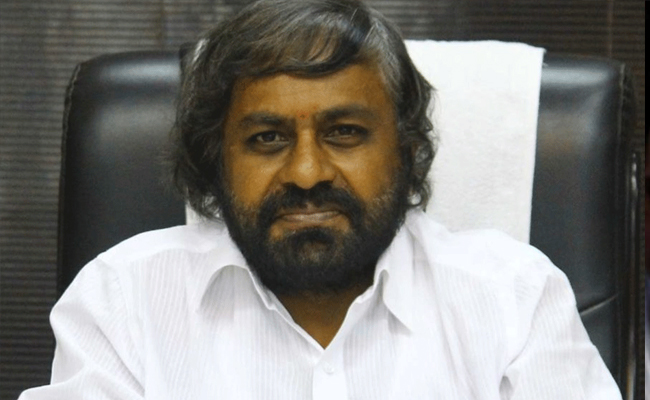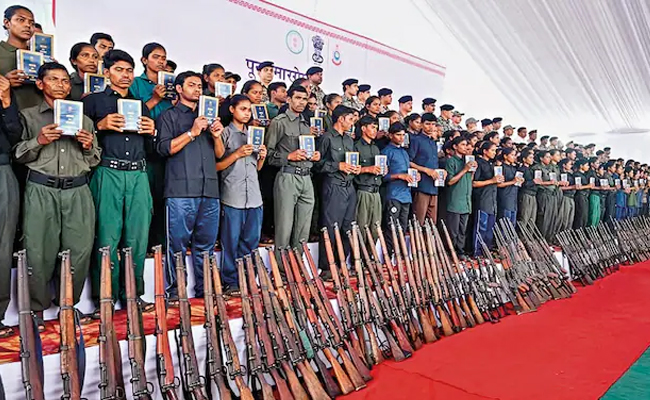Bengaluru: In a significant jolt to Prime Minister Narendra Modi's 100-day agenda to start mining iron ore in Devadari Hills of Sandur in Ballari, Karnataka’s Minister for Forests and Environment, Eshwar Khandre, on Saturday ordered a halt to the leasing of 401.5761 hectares for iron ore mining in the Devadari Hills.
This comes days after the Union Minister of Heavy Industries and Steel, H.D. Kumaraswamy had directed officials of Kudremukh Iron Ore Company Limited (KIOCL) to commence mining activities in the Devadari forest area.
Minister Khandre highlighted that KIOCL has previously failed to comply with the Centrally Empowered Committee (CEC) directives appointed by the Supreme Court regarding its mining activities in Kudremukh National Park, located in Mudigere taluk of Chikmagalur district. The company's inability to implement remedial measures for its past operations prompted the decision to halt new leases in the Devadari Hills.
ALSO READ: JD(S) MLC Suraj Revanna arrested for alleged sexual abuse of party worker
Environmentalists have raised concerns about the potential ecological impact of mining in the Sandur forests, fearing it could lead to the felling of approximately 99,000 trees. They argue that the mining activities would devastate local wildlife and communities, urging the Ministry of Environment, Forest and Climate Change to suspend clearance for the Devadari mining project.
In response to these environmental concerns, Union Minister Kumaraswamy assured that there would be no deforestation. He noted that the state government had approved mining on over 404 hectares for the Devadari project in 2019, with subsequent approval from the Central Environment Department. Kumaraswamy emphasized that KIOCL would undertake compensatory afforestation, planting an alternative forest over 808 hectares at a cost of Rs 194 crore before beginning iron ore extraction. He stressed that the Devadari project aims to boost steel production and create jobs.
Let the Truth be known. If you read VB and like VB, please be a VB Supporter and Help us deliver the Truth to one and all.
Bengaluru: Across Karnataka, a serious discussion has begun after the violence in Ballari and the swift action taken against police officers who were on the ground that day. The core question being asked is simple: when law and order fails, why are police officers the first to be shown the door, while political responsibility is quietly pushed aside?
The January 1 clash in Ballari was not a sudden street fight. It was a political confrontation involving supporters of two sitting MLAs. A banner related to the unveiling of a Valmiki statue became the flashpoint. What followed was stone-pelting, firing, and the death of a Congress worker. The situation spiralled within hours.
Within a day, Ballari SP Pavan Nejjur was suspended. Soon after, senior officers were reshuffled. Deputy Inspector General of Police Vartika Katiyar was transferred. No official reason was cited in the notification. But the timing made one thing clear: accountability, at least on paper, had been fixed.
Since then, there has been unease within police circles and political debate outside it.
Unconfirmed reports that Nejjur attempted suicide after his suspension were firmly denied by senior officers and the home minister. They said he was safe, resting, and under stress. Still, the very fact that such reports gained traction says something about the pressure officers feel when action is taken overnight, without public clarity.
Opposition leaders have called Nejjur a scapegoat, pointing out that he had taken charge only hours before the violence. They have asked how an officer can be blamed for a political clash he barely had time to assess. They have also drawn parallels with earlier incidents where police leadership was suspended after tragedies, while political decision-making remained untouched.
However, responding to this criticism, Home Minister G Parameshwara rejected the argument that the suspension was unfair because Nejjur had assumed charge only hours earlier. “It is not important whether he reported to duty on the same day (of incident) or one hour back. Duty is duty. He is not new to the department. IPS officers are trained to handle such situations any time. If he had acted swiftly and promptly, he could have prevented the situation from escalating.” He had said adding that Nejjur did not discharge his duties properly and that this was the reason for his suspension.
Now, fresh and unconfirmed reports suggest that Vartika Katiyar may have met a senior cabinet minister, questioning why she was made to pay the price for a situation that was political in nature. There is no official confirmation of this meeting. But the talk itself has added fuel to the debate.
What is being discussed in the state is not whether the police made mistakes. Many acknowledge that the situation on January 1 was mishandled. A clash earlier in the day was allowed to cool down without strong preventive action. Later, a banner came up near a politically sensitive location. The crowd should not have been allowed to build up. Better anticipation was needed.
At the same time, critics are asking whether the entire burden can be placed on officers when the trigger itself was political rivalry. Who installed the banner? Who mobilised supporters? Who had armed private gunmen present at the spot? These are questions that are still part of the investigation, yet administrative punishment moved faster than political accountability.
This has led to a wider comparison with past incidents, including the Bengaluru stampede after the RCB victory celebrations. There too, police officers were suspended after lives were lost, while decisions taken at higher levels were defended as unavoidable. Many are now saying Ballari fits into the same pattern.
The argument being made is not that the police are blameless. The argument is that responsibility appears to stop at the uniform. When things go wrong, officers are transferred or suspended to send a message. But when the violence is rooted in political rivalry, that message feels incomplete.
Within police ranks, there is also quiet concern about working conditions. Officers say they are expected to manage volatile political situations overnight, often with little room to push back against powerful interests. When things hold, they are invisible. When they collapse, they stand alone.
The Ballari episode has once again exposed this fault line.
For the government, the challenge is larger than one suspension or transfer. The real test is whether it is willing to publicly acknowledge political failures when law and order breaks down, instead of letting the system suggest that the police alone dropped the ball.
For now, what remains is a growing feeling across Karnataka that accountability is selective. And that whenever politics turns violent, the easiest answer is to change the officers, not the decisions that led to the violence in the first place.





